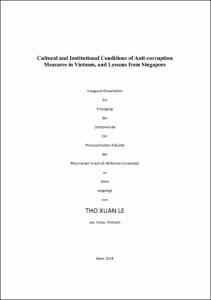Cultural and Institutional Conditions of Anti-corruption Measures in Vietnam, and Lessons from Singapore

Cultural and Institutional Conditions of Anti-corruption Measures in Vietnam, and Lessons from Singapore

| dc.contributor.advisor | Tänzler, Dirk | |
| dc.contributor.author | Le, Tho Xuan | |
| dc.date.accessioned | 2020-04-24T19:57:42Z | |
| dc.date.available | 2020-04-24T19:57:42Z | |
| dc.date.issued | 06.12.2018 | |
| dc.identifier.uri | https://hdl.handle.net/20.500.11811/7455 | |
| dc.description.abstract | Vietnam's struggle against corruption is stuck for a long period regardless of the recognition of the global trillion-dollar pandemic as "internal enemy to national development". There is a shortage of vision, insights, innovative methods and political will for change. Exacerbating this problem, corruption research in Vietnam was mainly quantitative, policy oriented, project-based, or sector-focused while qualitative and academic insights of cultural conditions and social construction of corruption is underestimated. Considering the problem, this PhD study analyses the cultural and institutional conditions comparatively for Vietnam and Singapore, in search for the best applicable anti-corruption practices. Singapore is the best choice to reflect most clearly how different visions of development, capitalism and socialism, with similar national contexts of Confucianism, colonial heritage and pre-modernity conditions, can lead to opposite measures and achievements of anti-corruption. Research findings confirm that Vietnamese cultural and formal institutions interplay in spreading corrupt practices. The key institutional determinants are the authoritative political system, inefficient public governance, weak law enforcement and rule of law, weak civil society and censored press that hinder transparency, accountability, leading to bear opportunities, to loosen rewards and to reduce the costs for corruption. On the other side, common tolerance on corruption as a solution for social transactions, and transitional "social value disorder" nurture corrupt practices. A conditioned radical-system-change resolution, through knowledge transfer, is required if Vietnam wants to transform itself like Singapore in response to corruption. More specifically, the Vietnam's reforms bear winners and losers through widening inequality gaps and injustice due to the emergence of minor illegitimate "new rich", rent-seeking public officials at the expense of the majority of poor, vulnerable groups such as voiceless and land-losing farmers. A strong requirement is for the rule of law, good governance, transparency, accountability, and a general integrity in public sector. | en |
| dc.language.iso | eng | |
| dc.rights | In Copyright | |
| dc.rights.uri | http://rightsstatements.org/vocab/InC/1.0/ | |
| dc.subject | anti-corruption in Vietnam | |
| dc.subject | institutions | |
| dc.subject | culture | |
| dc.subject | Singapore's lessons | |
| dc.subject.ddc | 300 Sozialwissenschaften, Soziologie, Anthropologie | |
| dc.title | Cultural and Institutional Conditions of Anti-corruption Measures in Vietnam, and Lessons from Singapore | |
| dc.type | Dissertation oder Habilitation | |
| dc.publisher.name | Universitäts- und Landesbibliothek Bonn | |
| dc.publisher.location | Bonn | |
| dc.rights.accessRights | openAccess | |
| dc.identifier.urn | https://nbn-resolving.org/urn:nbn:de:hbz:5-52531 | |
| ulbbn.pubtype | Erstveröffentlichung | |
| ulbbnediss.affiliation.name | Rheinische Friedrich-Wilhelms-Universität Bonn | |
| ulbbnediss.affiliation.location | Bonn | |
| ulbbnediss.thesis.level | Dissertation | |
| ulbbnediss.dissID | 5253 | |
| ulbbnediss.date.accepted | 19.12.2017 | |
| ulbbnediss.institute | Philosophische Fakultät : Institut für Politische Wissenschaft und Soziologie | |
| ulbbnediss.fakultaet | Philosophische Fakultät | |
| dc.contributor.coReferee | Antweiler, Christoph |
Files in this item
This item appears in the following Collection(s)
-
E-Dissertationen (713)




